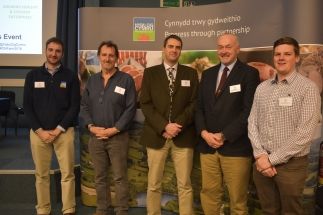- Home
- News & Industry
- Farmers gather to discuss top tips for lambing time
Farmers gather to discuss top tips for lambing time

Farmers, students, vets and grassland specialists gathered at Aberystwyth this month for an in-depth discussion on how to make the most of lambing time.
The session was organised by Hybu Cig Cymru – Meat Promotion Wales (HCC) as the first of this year’s series of workshops, designed to make the latest research and expertise available to Wales’s livestock farmers.
Held at Aberystwyth University’s Institute of Biological, Environmental and Rural Sciences (IBERS) in Gogerddan, a hub of world-leading agricultural research, an afternoon session saw young farmers and students hear presentations from Roger Daniel from the Welsh Veterinary Science Centre (WVSC) and Iwan Lewis from Ystwyth Vets, on promoting flock health and preparing for lambing, as well as HCC’s Dr. Eleri Price on the RamCompare genetics project. An open evening session for all farmers saw Mr. Daniel and Mr. Lewis joined by Aberystwyth University IBERS grassland specialists John Moorby and Alan Lovatt.
Dr. Moorby and Mr. Lovatt discussed the practical application of their innovative grassland research. This included ensuring the best possible nutrition for pregnant ewes at lambing time, producing grass-fed lambs whose meat contains high levels of Omega 3 fatty acids which benefit consumers’ health, and reducing greenhouse gas emissions from livestock.
HCC’s Industry Development Executive James Ruggeri said; “HCC works with other organisations to support research which is of benefit to the livestock industry, and workshops such as these are a chance to bring specialists and farmers together.”
He added, “With lambing time upon us, issues of sheep nutrition and health dominated the discussion. Iwan Lewis presented information which showed that the first 48 hours of a lamb’s life is crucial for minimising losses, and all four speakers had interesting insight and tips on how to ensure the best nutrition for ewes, best practice at lambing, and how to detect and avoid the most common causes of ill-health in flocks.”
The workshops are set to continue with a meeting in south-east Wales in late-spring.

